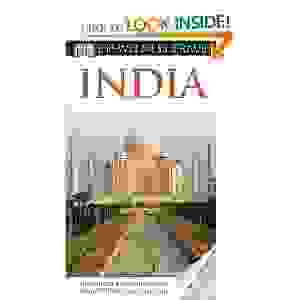Think you can go it alone on the road with nothing but your trusty backpack and an intrepid spirit of adventure and go wherever your whims may take you? Do you spurn the guidelines laid out before you from the corporate crowds of boredom-inducing must-see tourist attractions and world-class hotels? Do you scoff at the word guidebook in the first place?
Well, you’re not alone. As digital alternatives become increasingly available, many backpackers are ditching the guidebook and getting by on word-of-mouth tips, independent research, and unplanned meandering. It can work out well enough, and sometimes the randomness of it all, as well as the complete lack of preconceived notions, can make for utterly unique experiences that no book could have crafted for you.
So as you plan your next wild and crazy international adventure (or low-key and relaxing vacation, if that’s your thing), you might be eyeing the massive brick that is a Lonely Planet or Rough Guide volume, wondering if you can get by without the damn thing.
So should I travel with a guidebook or not?
Well, the short answer is it depends. Plenty of pros and cons exist on both sides, but as of now, given current technological realities and business strategies, I can unequivocally say:
Traveling with a guidebook is way better than not.
I will defend this point to the death. Although carrying around those massive monstrosities all day long is excruciatingly annoying (and I have certain methods to reduce this hassle), the advantages are just hands-down superior to the alternative.

Digital research and tips from fellow backpackers present their own problems. Most notably, what if the guy was an idiot?!?! Guidebooks sort of have this problem as well, but…less often so. And besides, there is simply no way that online research will ever match the convenience of having everything you need, all in one place, with zero Google searches to make it happen. And if you throw your arms into the air complaining about how guidebooks have bad information, I will merely point out that so does the internet!
Now that’s not to say this is the one and only way to do it; I merely want to help backpackers make the best decision. You can still travel without one, but you should be well aware of the pros and cons before you make the decision to fly off to the other side of the planet without any way of knowing what the hell is going on.
So, familiarize yourself with your predicament before you run away:
Advantages of traveling with a guidebook:
- The goddamn map. This is quite possibly the #1 most useful feature of a guidebook. When it’s 3AM and you’re wandering around a town and have no idea what’s going on, a map is going to be your best friend. You can waste an awful lot of time and energy wandering around trying to find a hostel or a train station, and sometimes asking for directions can be tricky, especially if it’s the middle of the night, or you don’t understand the language. It also helps to plan your sightseeing around closely-clustered sites, rather than retracing your steps because you didn’t know where things were. Sure, there are taxis, but how much do you want to spend on taxis instead of just buying a book instead? Plus, if you just buy or print your own maps, you’re spending money anyway.

Try researching ALL OF CHINA all on your own. Possible? Yes. Easier than buying a $30 book? No. - Cultural information. A well-written guidebook with helpful historical information and tips on understanding the local customs is incredibly useful. If you go somewhere on your own, you might have no idea that certain gestures can be offensive. It can be challenging figuring this out on your own, since you might not even know which questions to ask. This is also great reading material, as the history chapters are fun to read on those 8-hour bus rides, and helpful, too.
- Bus and train schedules. Sure, this type of information changes frequently, but guidebooks will at least give you a basic idea of how many buses leave per day, and you’ll know whether you need to plan ahead (when it’s one bus per day), or not (when there are dozens), plus they’ll give you an idea of how long it’ll take, so you can plan ahead, rather than finding out at the last second that it’ll take 6 hours instead of 3.
- Prices. Again, highly subject to change, but it’s probably going to be fairly small. You can at least get a general idea of what your daily or monthly budget is going to be, and if you add 10% to the total, you won’t freak out when a hostel’s prices have increased by a dollar or two.
- Sites. No word-of-mouth tips from hostel buddies will give you comprehensive information about everything worth seeing in a city. They’re likely to mention just a few places, half of which you probably already knew anyway. It’s not a bad idea, but if you rely only on these sorts of tips, you’ll often miss something interesting. It’s not like someone in a hostel is going to fill you in on every site in the city. That would be silly. However: A major weakness of guidebooks is a lack of pictures. They’ll describe things, but it’s hard to get an idea of what you’ll enjoy without seeing a photo. This is where pre-trip online research excels. But once you get there, the guidebook will give you a map of them.

Eyewitness guidebooks are flooded with quality photos, making them great for figuring out where you want to go (can’t say I’ve used them on a trip, but I’ve flipped through them for the photos) - Everything in one place. Think for a moment about what you’d have to do if you wanted to travel without a guidebook. You’d need to research the country’s history, customs, prices, major sites, transportation schedules, visa requirements, and more; then you’d have to print out or buy a map of every place you’d like to visit, unless you’re willing to get lost rather frequently. Think about all that time and effort, and then think about the fact that you’d probably forget half that info while you’re on the road. Now compare it to spending $25 and having all that info at your fingertips at all times. If your job pays $12.50 an hour, you need to do 100% of your research in two hours to make independent research cost-effective. And if you’re spending thousands of dollars on a trip, is an extra $25 really going to kill you?
- It’s never offline. Someday we’ll have globally connected digital devices able to call up anything and everything at any time. In fact we’ll just have chips in our brains that do this all for us. But until then, even your fancy new smartphone is going to fail you at some point. If you plan to rely on the internet for your travel plans, and you can only access this information online, you might find yourself wandering the streets in the middle of the night trying to find an internet café so you can go online and find the hostel address you lost on the bus yesterday. Oh, it’ll happen. Just you wait.
- You can plan on the bus. By the time you get to wherever you’re going, you’ll have looked over the map, where to go, and how much it’ll cost. If you’re using nothing but online tools, you’ll show up in a town with no idea what the hell is going on. Even if you research ahead of time, you’ll probably have forgotten something or other by the time you arrive.
How to get by with digital alternatives:
So it’s not that you can’t survive without a guidebook, but you’ll definitely need to know what you’re doing to overcome the obstacles. It’s not insurmountably difficult, but it will definitely take some planning. I highly recommend Wikitravel as a comprehensive resource, though many of the guidebook publishers have plenty of information online as well.

- Print the maps. This is easy enough. They’ll also fold up and fit in a pocket. Print out a few extra cities you’re not totally sure you’ll visit, just in case. You can always give them away to random people when you’re done. Mark the sites you plan on visiting, and maybe add a sentence or two to tell you which is which. You might forget the names.
- Fill the back with info. At the very least, write down the name, address, and phone number of a few hostels. You can book ahead, but sometimes you might not get around to it.
- Read about the culture. A lot. This is the type of thing you won’t be able to replace while you’re on the road. Sure, you can read about it online, but if you’re having an amazing time in Spain, you’re not going to duck into the internet café to look up dinner etiquette or whatever. Read up on the country and its customs ahead of time, since you probably won’t be doing this sort of research while you’re there, as you’ll be far too busy dealing with the trip itself to spend much time on it.
- Ask lots of questions. You’ll probably have to do this a lot. With everything from bus schedules to restaurant recommendations to museum closing times, there’s a lot of info you’ll miss by skipping the guidebook. You’ll need to ask about all sorts of things, all the time, to make up for it.
Current winner: Still the guidebook!
To be honest, I’ve only ever travelled with a guidebook, so it’s hard for me to know just what sort of challenges you’d face without one. The advantages are usually pretty obvious, though. It’s just so easy to open up the book and check train schedules or find a post office or a call center or whatever, that I can’t imagine having to do each and every single step without one.
I think part of the issue is that I tend to visit smaller towns as well. If you’re hopping from one major city to another, you’ll easily find a map and helpful hostel staff that’ll take care of everything you might need. If it’s a good hostel, anyway. But if you’re planning on visiting some out-of-the-way places in the middle of some relatively untouched rural area, it’s a lot harder. Particularly when the town has exactly zero internet cafés.
Quick trips that involve a lot of moving from one place to the next involve a lot more planning, whether it’s finding accommodation, juggling bus schedules, budgeting sightseeing time and so on, making guidebooks great for these sorts of trips. It’s a lot easier to get by without a guidebook if you’re just going to be in Paris and Rome for a week each and that’s it.
Also, if the trip is totally open-ended and you don’t care how long it takes for you to get from one city to the next, skipping a guidebook makes a lot more sense. You can just wander randomly all over the place with no plans, and if that’s how you like to do things, well then have fun. Asking random strangers for directions dozens of times per day is likely to lead to some interesting encounters, too.
What shall bring the inevitable fall of guidebooks
Well, smartphones. Once a global network is built that will allow anyone at any time to use any phone from any country in whichever country they want without roaming fees of any kind, Lonely Planet will collapse into a pile of ashes. Unless they make an app, of course. They should probably get on that.

But I think it’ll be a long time before telecommunication companies make this a reality. They like money, after all. I think the real challenge to guidebooks is the pamphlet model. Most people don’t need every bit of info available in the book, and if a service ever offered print-on-demand chapters consisting of 50 pages that could fit into a pocket, guidebooks would be in trouble. There would definitely still be a place for them, but I just can’t say enough good things about how great it is to cut the guidebook into tiny pieces and shove the chapters into a back pocket.
Maybe I should just start this idea…




Even though I, very often, bring a guidebook along and totally neglect to use it, I’m still on team guidebook, too. It’s such a good resource to have if you do ever end up needing it. Like you, I cut (well, microwave) my guidebooks apart. The maps alone can make it worth it.
You don’t need a global network for smartphones to be useful. I download PDF versions of my favorite guidebook, make some PDF’s of Wikitravel and a few other pages I think may be useful, and then load them on my smartphone. Then, instead of looking like a lost tourist while standing on a street corner paging through my guidebook looking for a map, I just look like an idiot tourist playing with my smartphone.
Okay, definitely a good point. Downloading an entire country from Wikitravel into PDF form will probably take care of things. Then it’s just battery life you have to watch out for. And hopefully you didn’t miss any important pages…
I do the same as Ryan and do my research online, save some useful info onto dropbox, update it on my phone and bring it with me.
I enter all the interesting places on my Pocket Earth map and follow it when I want to.
I’ve never traveled with a proper guide book and probably never will, though I can imagine that new (better) apps will come out soon that will make it easier to carry a good guide around, and then I would consider it! :)
Yeah, apps are going to do it. If people are already using their phones by finding info from all over the web and saving it to their phone, then all it’s going to take is an app designer that does it all for them.
That is actually a great question. I strongly believe that guides are great for those who just started travelling. They give you great hints and suggestions and make your travelers a lot easier. However, I think you shouldn’t use it that much as it is so addictive and then you might miss some important spots or places because you rely on guides too much. Keep it balance, use it when you feel lost or insecure – that’s my opinion :)
That’s true. I know I’ve missed out on places that weren’t in the book, but it’s hard to know if online research would have solved the problem, or if I’d have missed out on something else. But it’s so easy to use the guidebook as just a guide, and then get personal opinions on the road anyway, and that’s a nice way to do things.
Love guidebooks. Even with my iphone and local SIM card, a guidebook is hard to replace. I mean, in some places I’d rather look like a tourist with a book, then a tourist with an expensive gadget. For sight seeing during the day, taking pics of the map and use that as a reference will save weight as well.
I am all for guidebooks. I questioned purchasing one for my upcoming trip to Thailand thinking that I could just use the digital version on my iPad…but I’m a traditionalist. I enjoy putting them on my bookshelf after a trip, but I really like your idea of cutting them apart. Seems like it makes it easier to find that one random page in a book of 500+ pages
Yeah, if you only have to flip through 50 pages instead of 500, it’s easy. Though I prefer to get multinational guidebooks and cut them into countries, rather than getting a country guidebook and cutting them into smaller chapters, since it’s hard to keep track of whether you want the chapter for Northern Thailand or Northwestern Thailand.
While I fully agree with taking a paper-based guidebook on the road, I don’t think the maps contained in them are an advantage.
I always get frustrated by the lack of detail, certain parts missing or no map at all for an area of interest.
Ever since I’ve owned a smart phone, I’ve substituted paper-based maps with apps like CityMaps2Go. It allows you to download maps of cities and then use them in a similar fashion to Google Maps, without an internet connection. There’s even the option of downloading relevant Wikipedia articles. I’ve never gone back.
I just bring a small additional battery to boost my phone battery if really needed.
I’ve started enjoying the smartphone map alternative, and it’s great. When I have both smartphone and a paper map with me, I generally reach for the paper map first, but that’s partly because I’m paranoid about taking out a fancy phone in certain neighborhoods. Depends on what sort of country you visit, though.